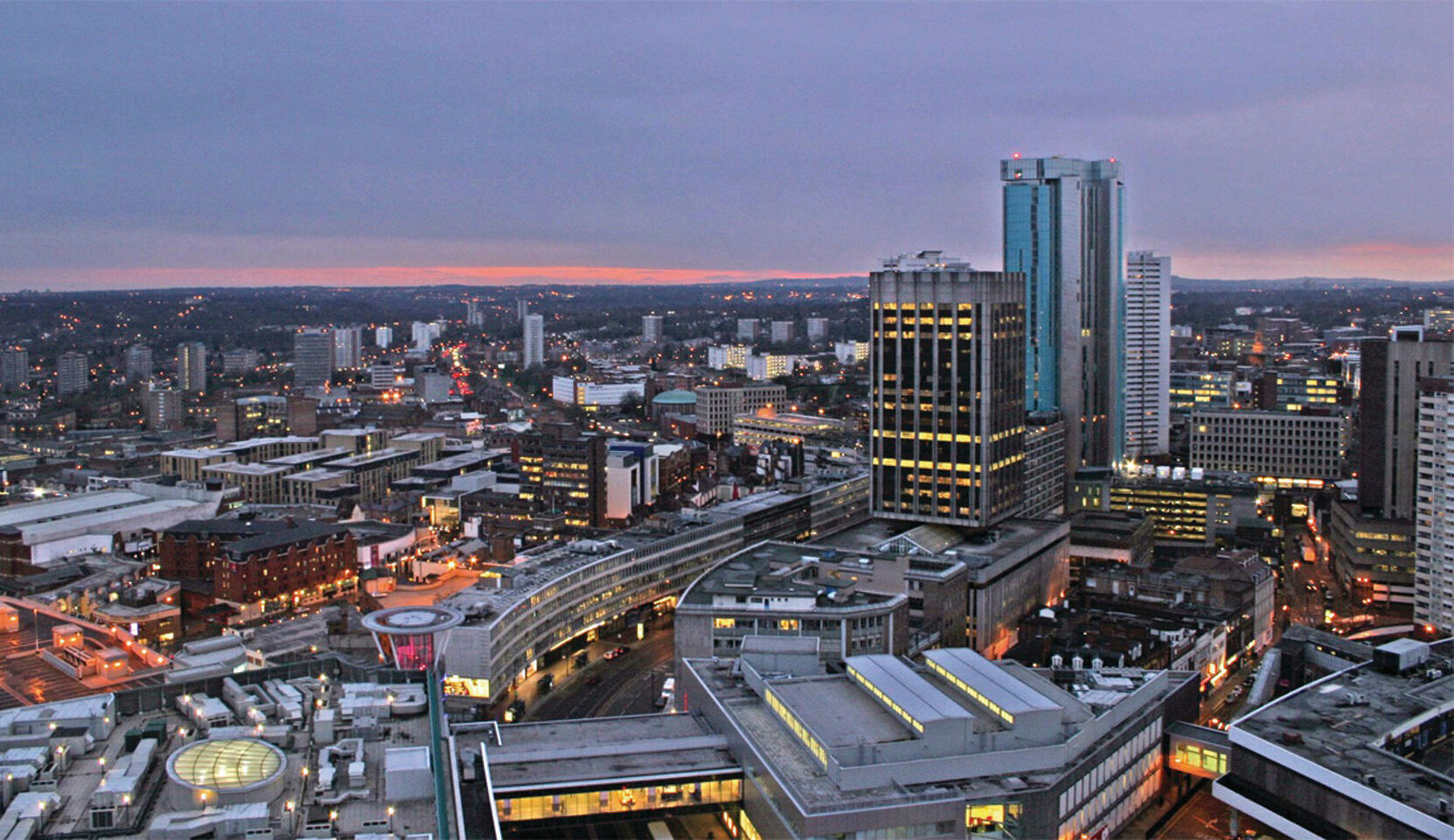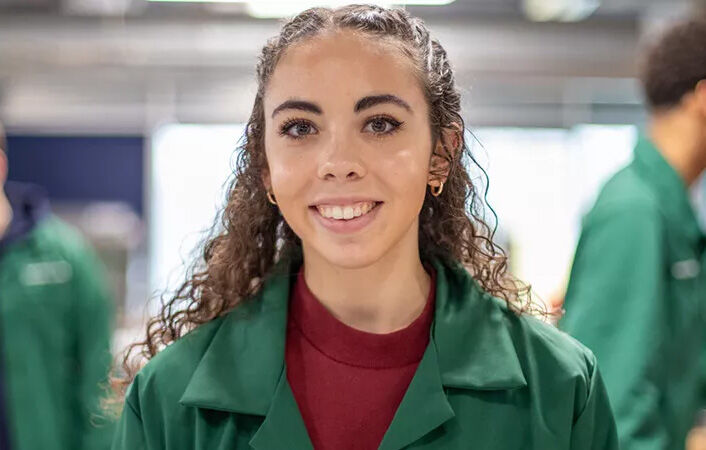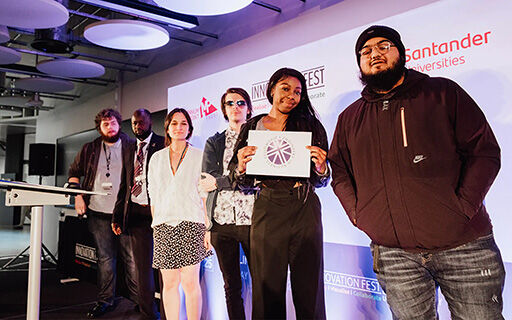
Civil Engineering - BSc (Hons)
Currently viewing course to start in 2026/27 Entry.
Are you ready to shape the world around you, from essential infrastructure and transport systems to innovative buildings and public spaces? Our BSc (Hons) Civil Engineering degree offers a comprehensive and future-focused education that prepares you to design, build and maintain the structures and systems that keep society running....
- Level Undergraduate
- Study mode Full Time
- Award BSc (Hons)
- Start date September 2026
- Fees View course fees
- Subjects
- Location City Centre
This course is:
Available with Professional Placement year
Open to International Students
Overview
Scholarships are available for this course. Find out more and apply now
Birmingham is the second largest city in the UK and is a great area for students to be in if you want to be in the built environment because there's redevelopment going on all around you and there's also a strong possibility that you could be working on these projects in the future. I've had a really good experience at BCU so far. We get to go on quite a lot of site visits. One of the biggest ones we've been on so far was the housing development by Taylor Wimpey, and we also had for our first assignment Taylor Wimpey's, managing director of the West Midlands, assessed one of our presentations. Support from lecturers is really, really good that always there, they're always there to reply to your emails no matter what the query is. They've all had real life experience, academic and industry wise, that we can learn from. One of the things that I'm most passionate about the built environment is the possibility of working on the creation of the built environment that we live in. I wanted a change of career. I wanted to do something that's a bit more impactful and something that can help the community. So I think the built environment was a perfect way to go about the student experience has been amazing, to be honest. The lecturers and the students actually have been very welcoming. There's definitely something for every person to get involved in. The Careers+ and Employability team and the support that I got from them with regards to updating my CV, get my professional network set up on LinkedIn, which has been excellent. So I was lucky enough to secure a placement with Atkins. After my placement year, I was actually offered the graduate role, which was fantastic because it meant that I've got something secured and now go back into industry and into a company that I really enjoyed working with.
It's only four years for me to change my career and really step into a brand new industry. And I'm really thankful for BCU for supporting me through this journey. There's always been something about buildings that has interest in me, kind of curious and how they're put together and what kind of technology goes into that. Coming to university, I knew that I wanted to go to Engineering or Architecture and seeing those courses in depth, I kind of knew to myself that it wasn't correct for me. So then I came across Architectural Technology and I found out it just answered both of those questions I had then, which was wanted to go to. So BCU offers a wide range of facilities. It provides a lot of equipment such as VR headsets, laptops that students can borrow whenever they need to, and industry level software such as AutoCAD and Revit to really useful to us as being used as currency in our industry and will continue to be used throughout the years to come. Being able to go outside of the classroom and use industry level equipment really helps us as students get a vision of what it's like in practice. I've really enjoyed my time studying at BCU and I can't wait to what the future holds.
Are you ready to shape the world around you, from essential infrastructure and transport systems to innovative buildings and public spaces? Our BSc (Hons) Civil Engineering degree offers a comprehensive and future-focused education that prepares you to design, build and maintain the structures and systems that keep society running.
This course gives you a strong grounding in the core disciplines of civil engineering, including structural analysis, geotechnics, materials, and construction management, giving equal focus to infrastructure, transportation, and buildings. Whether you're interested in developing sustainable housing, designing efficient transport networks, or maintaining large-scale infrastructure, you'll gain the knowledge and skills to make a real impact.
Throughout your studies, you’ll apply theory to practice in our well-equipped labs, using the latest industry-standard tools such as CAD, BIM, and FEM software. You’ll also explore how digital innovation, environmental responsibility, and climate resilience are transforming the future of civil engineering - and how you can contribute to the change.
With a strong focus on project-based learning, you’ll have opportunities to work on engineering problems based on real-life scenarios, from planning new motorways to designing sustainable buildings and managing construction sites. Site visits and guest lectures from practising engineers help bring your learning to life and connect you with current industry practice.
You’ll also develop vital professional skills, including problem solving, communication, teamwork, and project planning, that are highly valued by employers. Optional work placements or summer internships will allow you to gain industry experience and strengthen your CV before you graduate.
Join us and start building a future where your ideas become the structures, systems, and spaces we all depend on!
What's covered in this course?
- Core Civil Engineering disciplines: Study key areas of engineering such as structures, geotechnics, materials and transportation.
- Infrastructure, transport, and buildings: Learn how to design and maintain everything from roads and railways to housing and public spaces.
- Digital tools and innovation: Use industry-standard software like CAD, BIM, and FEM, and explore how technology is shaping the future of civil engineering.
- Sustainability and climate resilience: Understand the environmental impact of engineering and how to build responsibly for a changing world.
- Career-focused experience: Develop key professional skills, prepare for lifelong learning, and have the option to gain valuable industry experience through placements.
Professional Placement year
This course offers an optional professional placement year. This allows you to spend a whole year with an employer, following successful completion of your second year, and is a great way to find out more about your chosen career. Some students even return to the same employers after completing their studies.
If you choose to pursue a placement year, you will need to find a suitable placement to complement your chosen area of study. You will be able to draw on the University’s extensive network of local, regional, and national employers, and the support of our Careers teams. If you are able to secure a placement, you can request to be transferred to the placement version of the course.
Please note that fees are payable during your placement year, equivalent to 20% of the total full-time course fee for that year.
Our BSc course connects engineering theory with practical experience, helping students tackle real engineering challenges with confidence. Through hands-on learning and industry-relevant tools, graduates are ready to contribute to sustainable, safe, and inclusive civil engineering projects from day one.
Dr Foroogh Hajiseyedjavadi, Course Leader
Why Choose Us?
- Study in Birmingham – a city built by and for engineering. Learn in one of the UK’s most dynamic and fast-growing cities, home to major building and infrastructure projects.
- Strong industry links and career prospects. Benefit from our course’s focus on transport and infrastructure, where demand for skilled graduates is high.
- Join a respected and well-established portfolio of courses. Our civil engineering courses are highly rated by students and trusted by employers.
- Learn by doing. From hands-on projects to site visits and industry placements, this course gives you real-world experience that employers look for.
- Be part of a community that reflects modern Britain. Join a welcoming, multicultural student body in a university that values inclusion and global perspectives.
- Cal Henderson Scholarship - Built Environment students can apply for the Millenium Point Scholarship and Cal Henderson Scholarship, both of which offer fully-funded degrees.
Open Days
Join us for our next Open Day where you'll be able to learn about this course in detail, chat to students, explore our campus and tour accommodation. Booking isn't open for the next event yet. Register your interest, and we'll let you know as soon as booking goes live.
Next Open Day: Friday 26 June
Entry Requirements
Essential requirements
Standard offer: 96 UCAS Tariff points. Learn more about UCAS Tariff points.
Accelerate offer: 80 UCAS Tariff points. Find out more about BCU Accelerate.
If you have a qualification that is not listed, please contact us.
Fees & How to Apply
UK students
Annual and modular tuition fees shown are applicable to the first year of study. The University reserves the right to increase fees for subsequent years of study in line with increases in inflation (capped at 5%) or to reflect changes in Government funding policies or changes agreed by Parliament. View fees for continuing students.
Award: BSc (Hons)
Starting: Sep 2026
- Mode
- Duration
- Fees
- Full Time
- 3 years
- £9,535 in 2026/27 ✱ Important note for this price
- Apply via UCAS
(↩Back to price) * The Government is proposing to apply an inflationary increase to regulated tuition fees for 2026/27 and the University is planning on increasing fees to that maximum level once confirmed.
International students
Annual and modular tuition fees shown are applicable to the first year of study. The University reserves the right to increase fees for subsequent years of study in line with increases in inflation (capped at 5%) or to reflect changes in Government funding policies or changes agreed by Parliament. View fees for continuing students.
Award: BSc (Hons)
Starting: Sep 2026
- Mode
- Duration
- Fees
- Full Time
- 3 years
- £18,570 in 2026/27
Guidance for UK students
UK students applying for most undergraduate degree courses in the UK will need to apply through UCAS.
The Universities and Colleges Admissions Service (UCAS) is a UK organisation responsible for managing applications to university and college.
Applying through UCAS
- Register with UCAS
- Login to UCAS and complete your details
- Select your course and write a personal statement
- Get a reference
- Pay your application fee and submit your application
Guidance for International students
There are three ways to apply:
1) Direct to the University
You will need to complete our International Application Form and Equal Opportunities Form, and submit them together with scan copies of your original academic transcripts and certificates.
2) Through a country representative
Our in-country representatives can help you make your application and apply for a visa. They can also offer advice on travel, living in the UK and studying abroad.
3) Through UCAS
If you are applying for an undergraduate degree or a Higher National Diploma (HND), you can apply through the UK’s Universities and Colleges Admissions Service (UCAS).
You can request a printed form from your school or nearest British Council office. You will be charged for applying through UCAS. Birmingham City University’s UCAS code is B25 BCITY.
Personal statement
The personal statement gives you a crucial opportunity to say why you’re applying and why the institution should accept you.
Here are the three areas you’ll need to address:
- Why do you want to study this course or subject?
Here’s where you explain what makes this course exciting to you. Think about your motivations for studying the course and your future plans. If you’re planning to take a year out, don't forget to give your reasons.
- How have your qualifications and studies helped you to prepare for this course or subject?
This is your chance to show what you’ve learned at school or college. You should include the skills and knowledge you’ve gained from education or training and how this will help you succeed in your chosen course.
- What else have you done to prepare outside of education, and why are these experiences useful?
Not everything you’ve learned comes from the classroom. Life experience counts too! You might want to talk about work experience, employment, or volunteering and how they’ve helped you develop the skills needed for your chosen course or future career.
Worried about Personal Statements?
If you've got no idea where to start or just want to check you're on the right track, we’ve got expert advice and real examples from our students to help you nail your personal statement. You can even download our ultimate personal statement guide for free.
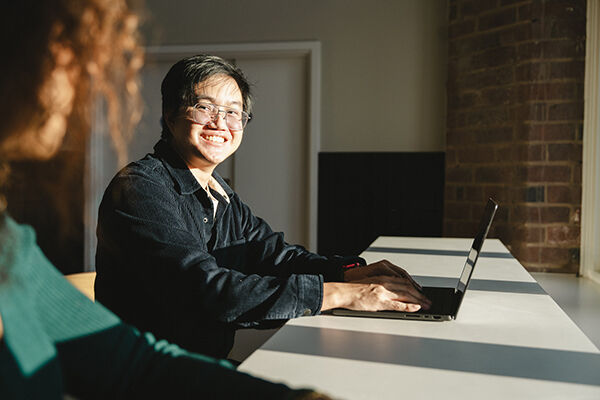
Cal Henderson Scholarship
Built Environment students could be eligible for a Henderson Scholarship worth £10,000 a year over three years, or a one-off Henderson Access Bursary of £2,000.

Financial Support
We offer further information on possible undergraduate financial support. This includes the type of loans, grants and scholarships available both from the government and from Birmingham City University.
Course in Depth
First Year
In order to complete this course you must successfully complete all the following CORE modules (totalling 120 credits).
Mathematics plays a key role in establishing and grounding the skills of an engineer, and the ability to communicate the ideas of engineering that are expected of an engineering graduates.
The primary aim of this module is to provide the fundamental mathematical knowledge and techniques needed in order to enable you to use and apply such mathematical techniques for the evaluation, analysis, modelling and solution of realistic engineering problems. Application of these data sets has to include their interpretation both to and from the mathematical language. In addition, this module will introduce students to mathematical modelling software package. This will be used to plot, annotate basic signals and write simple programs to compute mathematical problems.
This module will develop your ability to both work on and communicate engineering realities to a wider audience, at a professional standard.
Civil Engineering is a discipline that covers wide range of subjects and knowledge, essential to solving real-world problems, such as climate change and the environment impact of infrastructure. This requires a solid understanding of a wide range of Civil Engineering areas such as fluid mechanics, engineering geology, sustainability, and the applied practices of civil engineering science
Civil engineering infrastructures must be designed in order to resist environmental loadings and impacts. This requires fundamental knowledge of structural analysis of civil engineering structures and behaviour assessment of civil engineering materials subject to various types of loadings and stresses.
Civil Engineering is a practical discipline, whose output is typically described in the form of design reports. Civil Engineers are required to analyse competing solutions to engineering problems, often relying on incomplete data and contradicting requirements. Moreover, the environmental impact of civil engineering projects is considerable, and it is our social responsibility to minimise it. Civil Engineers need to communicate and justify their design decisions using a variety of media, such as text, calculations, drawings, models, as well as presentations to clients and other stakeholders. Finally, Civil Engineering is a discipline that typically requires working in teams: effective and transparent teamwork is the key to a successful Civil Engineering project.
Digital construction is an integral component of contemporary design, development and maintenance of modern residential development. Building Information Modelling (BIM) technology is at the forefront of the progressive movement towards total digitalisation of the built environment.
Gain insight into how construction sites are managed, seeing how health and safety, scheduling, resource planning, and leadership are applied on-site.
Second Year
In order to complete this course you must successfully complete all the following CORE modules (totalling 120 credits).
Learn how to design and analyse road infrastructure, in line with industry standards.
In accordance with the programme philosophy and aims, this module has been designed to enable you to use problem-based learning to understand the Technology of Civil Engineering and innovations now being applied. It investigates a civil engineering project from its inception to its construction and identifies the methods and techniques used in constructing a range of structures and infrastructure.
In accordance with the programme philosophy and aims, this module has been designed to enable you to use problem-based learning to understand the geological materials and effects of soil mechanics on Civil Engineering and relate it to information about the geotechnical tests and reports. It includes opportunities to complete laboratory tests to define certain properties of soils.
The module follows the Civil Engineering programme philosophy of developing your intellectual and practical competence in technical, theoretical and environmental aspects of civil engineering. Similarly the learning and teaching philosophy incorporates learning through formal lectures including, seminars, tutorials, laboratory tests and problem based scenarios. Learning is practice-based, knowledge applied and work related including project based activities.
Develop your design skills through project-based learning, working together with students from other Built Environment disciplines, and producing solutions that consider a range of real-world constraints.
In accordance with the programme philosophy and aims, this module has been designed to enable students to use problem-based learning to understand the properties, behaviour, and uses of materials of Civil Engineering. The module follows the Civil Engineering programme philosophy of developing your intellectual and practical competence in technical, theoretical and environmental aspects of civil engineering.
The learning and teaching philosophy emphasises practical work. Laboratory activities consist a major part of the module, covering all common Civil Engineering materials. These are supplemented by seminars, group work activities, and problem-based scenarios. Students are encouraged to plan their own work schedules, manage their time and extend their presentational skills.
Building Information Modelling (BIM) is an intelligent 3D model-based process that provides built environment professionals with the insight and tools to help plan, design, construct, and manage buildings and infrastructure. In this module, you will be encouraged to explore the potential of BIM in helping to understand the social, economic and environmental benefits associated with co-ordinated infrastructure and complex structure development.
Professional Placement (Optional)
In order to qualify for the award of BSc (Hons) Civil Engineering with Professional Placement Year you must successfully complete the following module.
This module is designed to provide you with the opportunity to undertake a credit bearing, 40- week Professional Placement as an integral part of your Undergraduate Degree.
The purpose of the Professional Placement is to improve your employability skills which will, through the placement experience, allow you to evidence your professional skills, attitudes and behaviours at the point of entry to the postgraduate job market. Furthermore, by completing the Professional Placement, you will be able to develop and enhance your understanding of the professional work environment, relevant to your chosen field of study, and reflect critically on your own professional skills development within the workplace.
Final Year
In order to complete this course you must successfully complete all the following CORE modules (totalling 120 credits).
Work collaboratively across disciplines to deliver a full engineering design, combining structural, geotechnical, and environmental considerations using real-world data and digital design tools.
Explore how data and simulation are used to plan and optimise transport systems. Learn modelling techniques for traffic flow and sustainable transport planning.
Develop key skills in managing civil engineering projects, including budgeting, scheduling, and risk assessment, using tools and methods used by industry professionals.
Prepare for your career with a focus on ethics, continuing professional development, professional membership, and the responsibilities of engineers in today's global and diverse working environment.
Undertake a major independent research project on a topic of your choice, demonstrating your technical knowledge, problem-solving ability, and project management skills.
Download course specification
Download nowHow you learn
You’ll learn through a mix of lectures, seminars, hands-on lab work, group projects, and real-world case studies. From using industry-standard software like CAD and BIM, to working on practical engineering design challenges, you’ll apply theory to real engineering scenarios.
Site visits, guest lectures, and optional placements connect your learning directly to industry. With a strong focus on project-based learning and teamwork, you’ll develop both technical expertise and professional skills that prepare you for the workplace from day one.
Further studies
You could progress onto a range of postgraduate studies, including an MSc in Civil Engineering, Construction Project Management or other disciplines in Engineering and the Built Environment. You could also potentially go straight to doctoral research study.
Civil Engineering students explore HS2 construction site metres away from city centre campus
Civil Engineering students from Birmingham City University (BCU) have been given first-hand experience of a HS2 construction site, metres away from their usual classroom.
Employability
Enhancing your employability skills
You will learn of range of skills which will be key to enhancing your future employability, such as:
- Problem-solving: Learn to break down complex problems using analytical thinking, mathematics, and data.
- Creativity and innovation: Design practical, user-focused engineering solutions for the real-world, balancing client needs with sustainability and safety.
- Project and time management: Plan, manage, and deliver projects, staying organised and focused under pressure.
- Teamwork: Gain experience working in groups and leading projects, preparing you for the professional world.
- Communication: Develop confidence in explaining complex technical ideas clearly to both technical and non-technical audiences.
- Environmental, Social, and Ethical awareness: Understand the wider impact of your work on the environment and society, and learn to practice engineering in an ethical manner.
- Lifelong learning mindset: Build habits in self-development and adaptability, essential for any career path.
Graduate jobs
Civil Engineering graduates are highly sought after, with many securing employment opportunities well beyond graduation. Popular starting job roles include Graduate Civil Engineer, Graduate Structural Engineer, or Graduate Geotechnical Engineer, in companies of all sizes, from small and medium enterprises in the local market, to international corporations.
Beyond the Civil Engineering industry, our graduates are highly employable in a range of sectors, due to their highly analytical nature and range of transferable skills they have developed.
Placements
You will have the option of taking a year out placement, following the completion of the second year of studies.
BCU Civil Engineering students have recently been on placements with leading Civil Engineering companies such as AtkinsRealis, Mott McDonald, BAM Nutall, and Balfour Beatty, with many also securing opportunities in smaller companies locally and nationally.
Students regularly report enjoying their placement greatly, and they typically come back with a renewed commitment and focus on their university work in the final year!
Links to industry
Our Civil Engineering courses have strong links to the industry, both locally and nationally. Our modules regularly include guest lectures from practising engineers. Recent lectures were delivered by practitioners for companies such as WSP, Ramboll, Kier, and Laing O’Rourke.
We also have a strong Industrial Advisory Board, specifically for Civil Engineering courses, which provides guidance and advice on our courses, as well as mentorship opportunities to students. The membership of the Board includes companies such as Arup, WSP, AtkinsRealis, and Arcadis.
We have strong links with the relevant Professional Bodies, such as the Institution of Civil Engineers, the Institution of Structural Engineers, and the Institution of Highways Engineers. Representatives of these bodies provide presentations to our students, and many students choose to join one more professional bodies as student members as early as their first semester with BCU.
We also have established links with a range of universities and research institutions across the UK, Europe, and beyond.
How Has Birmingham’s Built Environment Accelerated the City?
The UK’s second city is thriving, read how the built environment is at the root of its success.
My experience as a female Engineer working for Jaguar Land Rover
Alessandra, an Engineering graduate, tells us about her experience as a female engineer working in the industry and how she adds perspective and value to any team, as well as how useful she found her course.
Innovation Fest
Innovation Fest is designed to foster entrepreneurship and support the development of our first-year students as future world-changers. The festival contributes to the knowledge economy, increasing students’ employability by providing genuine portfolio material.
Facilities & Staff
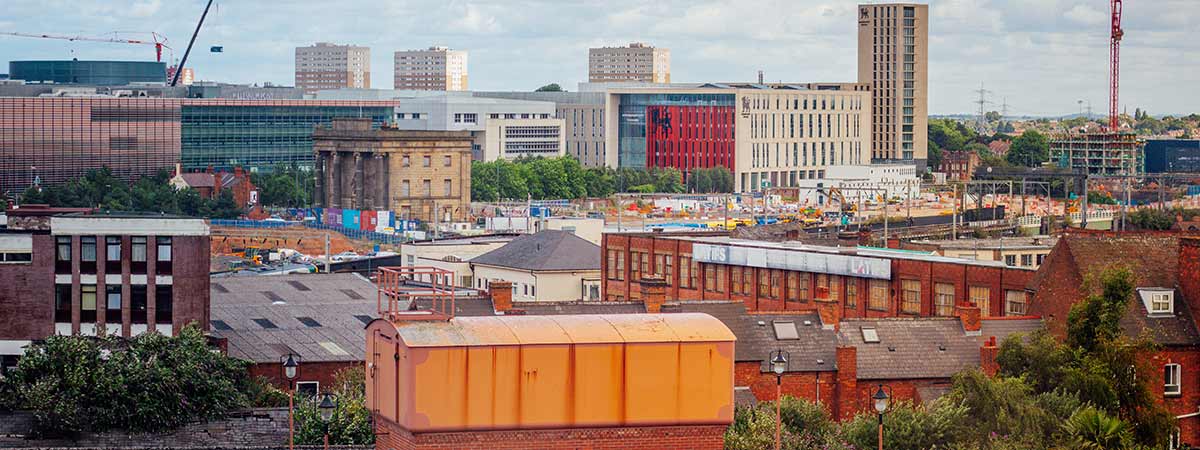
The facility our students value most is not actually on campus, but is the location of the campus in the heart of Birmingham’s Eastside opposite the new High Speed 2 station construction, and minutes from dozens of fascinating live projects within the city centre.
Birmingham as it changes constantly on our doorstep really is our ‘living lab’. By simply looking out the window of our classrooms you’ll be able to witness live projects as they’re happening around us. You’ll constantly be inspired by dozens of fascinating case studies just from walking from the station to the campus.
The facilities on offer to our students reflect the work environment you will enter as you start your career. Learn more about what we have to offer below.
Our staff
Foroogh Hajiseyedjavadi
Lecturer
Foroogh is a lecturer in Civil Engineering at the Department of Built Environment and a visiting research fellow at the University of Leeds. She has a PhD in Civil Engineering with the focus on Transportation Engineering from the University of Massachusetts Amherst, MA, where she also worked as a research and teaching assistant.
More about ForooghDr Andy Lim
Lecturer in Civil Engineering
Andy is a Lecturer in Civil Engineering at Birmingham City University. Prior to joining BCU Andy was a Research Officer in the ”Advanced Sustainable Manufacturing Technologies (ASTUTE)" project in the College of Engineering at Swansea University. He was also a Teaching Associate and Lecturer at London South Bank University.
More about AndyShuyin Feng
Lecturer in Civil Engineering
Shuyin is a Lecturer in Civil Engineering at the Department of Built Environment. She received her PhD and MSc by research in Civil Engineering from the University of Bristol, UK in 2022 and 2017, respectively.
More about Shuyin


